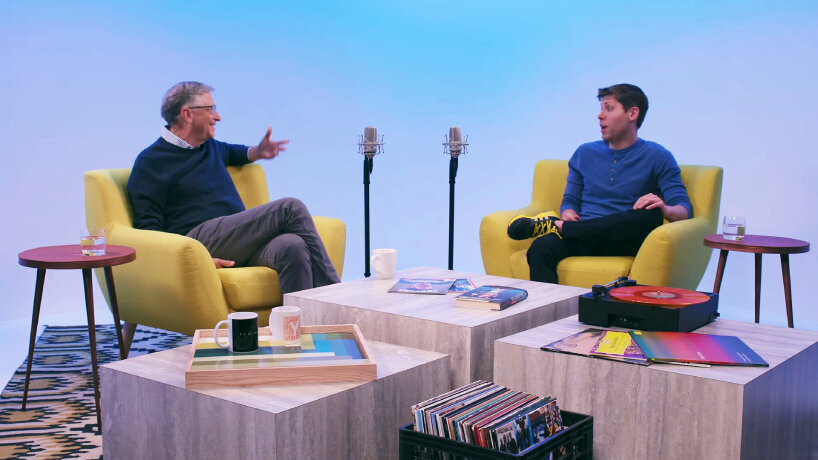Technocrats Gates and Altman admit current AI is the stupidest version of AGI but believe it can eventually "overcome polarization" – or in reality – censor views
By bellecarter // 2024-01-24
Tweet
Share
Copy

In the sixth episode of "Unconfuse Me," Big Tech bigwigs Bill Gates and Sam Altman tackled how they put high faith in the "stupidest" version of artificial general intelligence (AGI) as yet because they believe it could eventually help solve the world's hardest problems such as divisiveness.
"The stuff that we are seeing now is very exciting af,nd wonderful, but I think it's worth always putting it in the context of this technology that, at least for the next five or ten years, will be on a very steep improvement curve. These are the stupidest the models will ever be," CEO of OpenAI Altman admitted.
The ChatGPT maker said that at present, GPT-4 tackles most questions 10,000 times. This version is said to be more creative than its predecessors since this one can generate, edit and iterate with users on creative and technical writing tasks, including composing songs, writing screenplays, learning a user's writing style and more. "While one of those responses is likely to be quite good, the challenge lies in the model not always discerning which one. The goal is to consistently extract the best response out of the 10,000 possibilities each time, highlighting the significance of enhanced reliability," he added.
But the Microsoft founder is optimistic. "I do think AI, in the best case, can help us with some hard problems…Including 'polarization' because potentially that breaks democracy and that would be a super bad thing," he said. "Whether AI can help us go to war less, be less polarized; you'd think as you drive intelligence…I'd love to have people working on the hardest human problems, like whether we get along with each other. I think that would be extremely positive if we thought the AI could contribute to humans getting along with each other."
Moreover, the two alleged that the government didn't act on social media "polarization." "I don't understand why the government was not able to be more effective around social media, but it seems worth trying to understand as a case study for what they're going to go through now with AI," Altman said.
However, analysts are critical of the amount of control a certain group of people will have over the AI systems. For Reclaim the Net's Cindy Harper, the podcast discussion failed to present one aspect, which is the influence of the programmers' beliefs and principles on the programs. "The designers and developers inherently embed their ideas about democracy, free speech and governance into the AI's algorithms. This raises significant concerns about the impact of these personal biases on the AI's neutrality and its ability to make fair, unbiased decisions," the writer pointed out. "If an AI is designed to favor certain political or social viewpoints, it could potentially suppress opposing perspectives, leading to a form of digital censorship."
Altman is currently working closely with Gates to promote the use of AI.
 Gates interviews Altman on his "Unconfuse Me" podcast (DesignBoom.com)
Gates interviews Altman on his "Unconfuse Me" podcast (DesignBoom.com)
 Gates interviews Altman on his "Unconfuse Me" podcast (DesignBoom.com)
Gates interviews Altman on his "Unconfuse Me" podcast (DesignBoom.com)
AI robotics to replace humans in blue-collar jobs
Elsewhere in the show, the two technocrats tackled the robotics aspect of AI. This facet deals with the replacement of humans in blue-collar jobs and when AI gets hands and feet that are at human-level capability. "We started robots too early, so we had to put that project on hold. It was hard for the wrong reasons. It wasn't helping us make progress with the difficult parts of the ML [machine learning] research. We were dealing with bad simulators and breaking tendons and things like that. We also realized more and more over time that we first needed intelligence and cognition, and then we could figure out how to adapt it to physicality," Altman admitted but he said they are getting back at it. (Related: In five years, nearly HALF of all human skills will be replaced by AI.) According to him, they have started investing in robotics companies. On the physical hardware side, there are finally exciting new platforms being built already. "At some point, we will be able to use our models with their language understanding and future video understanding, to say, 'All right, let's do amazing things with a robot,'" Altman revealed. He also admitted that seven to 10 years back, their team thought that AI "blue-collar could happen first, white-collar work second, and creativity, maybe never but certainly last because that was magic and human." But now, he said, the creative work, which may seem like hallucinations on the GPT models, is already a feature, and not a bug. Check out FutureScienceNews.com for more stories about robots and artificial intelligence.Sources for this article include:
Assets.GatesNotes.com DesignBoom.com ReclaimTheNet.orgTweet
Share
Copy
Tagged Under:
glitch artificial intelligence robots politics propaganda censorship AI democracy cyber war tyranny conspiracy robotics bill gates deception cyborg insanity OpenAI inventions future science information technology computing future tech lunatics polarization technocrats Sam Altman Unconfuse Me
You Might Also Like
Scammers and spammers use AI SPAM to make money and mess up Google search results
By Zoey Sky // Share
Recent News
DOT removes 550 CDL training providers in nationwide crackdown
By lauraharris // Share
Meta's controversial AI patent: Keeping the dead "ALIVE" on social media
By bellecarter // Share
Trump orders UFO files release as secret Air Force jet spotted near Area 51
By kevinhughes // Share
Dietitians reveal the comfort foods you can eat without the guilt
By isabelle // Share
The secret to radiant skin: How to repair and protect your skin's natural barrier
By dominguez // Share











